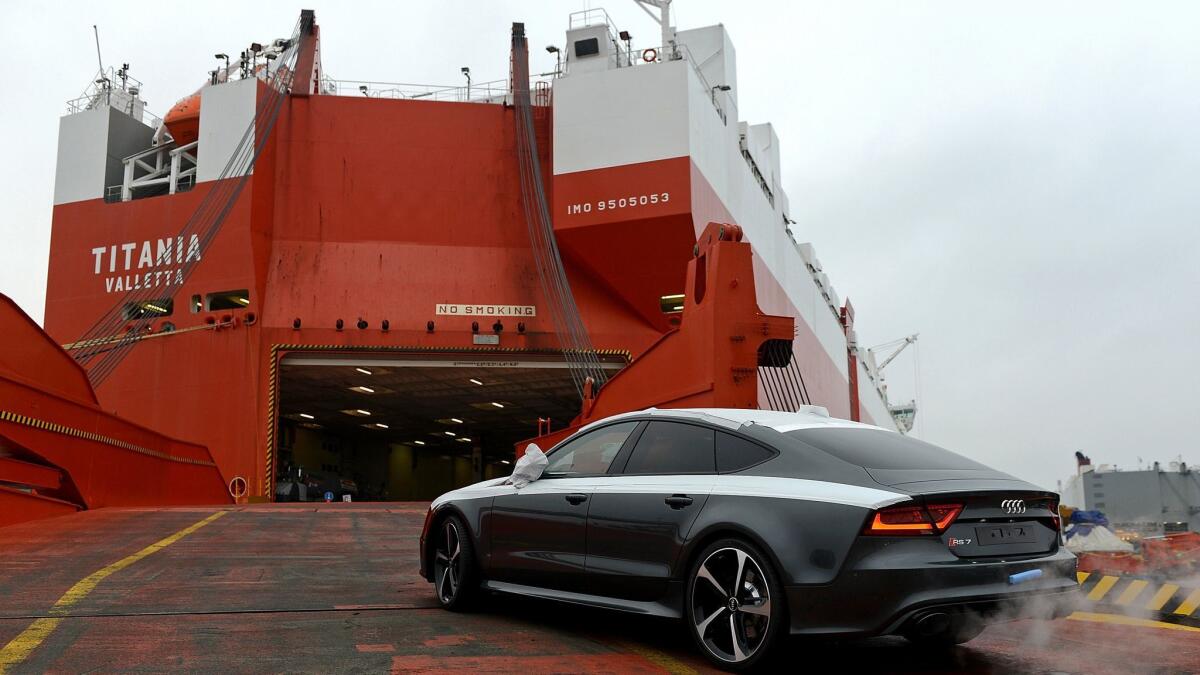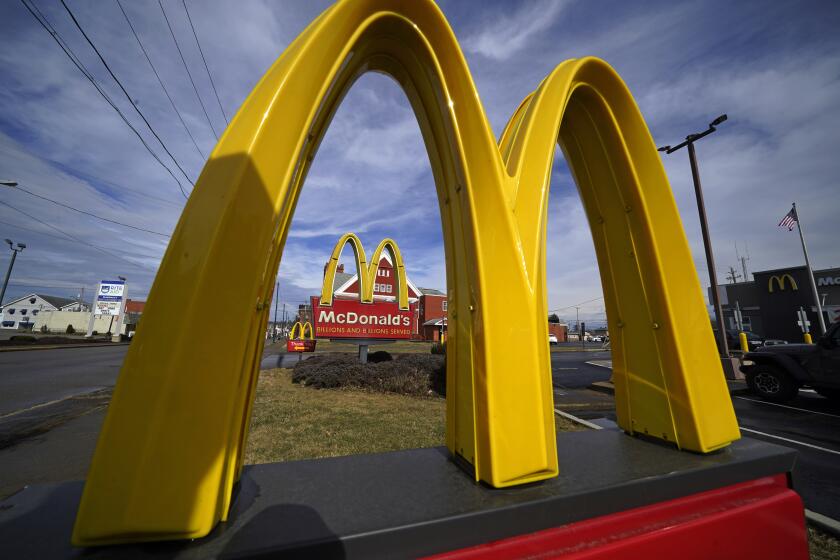Trump will decide if auto imports are a national security threat, as EU retaliation looms

President Trump received the findings of a probe into whether imported vehicles pose a national security threat, as the European Union threatened retaliation for any tariffs the Trump administration might impose.
Trump has 90 days to decide whether to act on the findings, which were delivered by Commerce Secretary Wilbur Ross on Sunday with no hint of the findings. Commerce started the investigation in May under Section 232 of the Trade Expansion Act — the same provision the administration used last year to slap tariffs on steel and aluminum.
Trump has threatened levies of as much as 25% on foreign-made vehicles. American and foreign-based auto manufacturers and dealers have lobbied against it. Companies and governments from Europe to Asia have warned Trump that tariffs on car imports would hurt the U.S. economy and disrupt the global auto industry, which is already mired in a slump.
An auto trade war would deal a blow to carmakers including General Motors Co. and Toyota Motor Corp., which have built their supply chains to take advantage of countries with low duties. The Commerce probe covers auto parts as well as assembled vehicles.
The National Automobile Dealers Assn. estimates that the tariffs would add as much as $2,270 to the cost of U.S.-built cars and $6,875 to the cost of imported cars and trucks. That would especially affect German brands such as Volkswagen, Porsche and Mercedes-Benz.
“Auto tariffs would be a disaster,” Peter Boockvar, chief investment officer at Bleakley Advisory Group, said last week. “So many parts from so many places that crisscross countries go into the making of an automobile. Of all the tariffs, this would be the most pervasive.”
If European exports are hit by U.S. actions, the EU will “react in a swift and adequate manner,” Margaritis Schinas, a spokesman for the European Commission, told reporters in Brussels on Monday. The EU has prepared tariffs on a total of $23 billion in U.S. goods should Trump follow through on his threat, which would chiefly hit Germany.
Chancellor Angela Merkel gave an impassioned defense of the country’s car industry to an audience of senior security officials in Munich over the weekend, calling the Trump administration’s suggestion that European autos are a threat to U.S. security a “shock.”
The renewed threat of car duties calls into question a tentative truce reached in July. At a meeting in Washington, Trump and European Commission President Jean-Claude Juncker agreed to a political accord to “work together toward zero tariffs, zero non-tariff barriers, and zero subsidies on non-auto industrial goods.”
At the July meeting, “we agreed that both the EU and the U.S. would refrain from taking any measures that would go against the spirit and the letter of the joint statement,” Schinas said. “President Juncker trusts President Trump’s word. The European Union will stick to its word as long as the U.S. does the same.”
If the U.S. imposed permanent tariffs of 25%, German car exports to the U.S. could fall by almost 50%, or about $19.2 billion, according to the Ifo Institute. Total European car exports would fall by $20.8 billion, or 7.7%. The risk to Germany’s economy prompted Merkel to push back by pointing to BMW’s plant in South Carolina, the carmaker’s largest factory worldwide and the home to models such as the X5 sport utility vehicle.
“Look, we’re proud of our cars. We’re allowed to be,” Merkel said Saturday in Munich, where BMW is based. “And these cars are built in the United States of America. If these cars — which are no less a threat than those built in Bavaria — are suddenly a national security threat to the U.S., then that’s a shock to us.”
The prospect of new tariffs just adds to the woes of automakers worldwide, which began the year on a weak note.
The global sales slowdown has hit earnings of almost everyone including Ford Motor Co., Volkswagen AG and Toyota Motor Corp., which also are spending billions of dollars on a shift to electrified and autonomous vehicles. Trade woes, political upheaval and diesel’s demise are hurting consumer sentiment, while the increasing availability of ride-hailing and car-sharing services makes it less necessary to own a car.
China just reported yet another monthly slump in car sales. Persistent gloom in the world’s largest auto market leaves automakers with few places to go. Japan is sputtering too, while volumes in other smaller markets aren’t enough to offset the declines in the biggest sales regions.
Even with an expected recovery in China in the second half, the global car market will stall this year or grow just 1%, said Janet Lewis, an analyst at Macquarie Group Ltd. in Tokyo. The U.S. and European markets will be little changed, she predicts.
“You can’t expect mature markets to grow significantly,” said Zhou Jincheng, an analyst at research firm Fourin Corp. in Nagoya, Japan. “The complexity of global trade environment is not helpful either.”
In another trade-related move, Honda Motor Co. said Monday it plans to close its factory in the U.K. It is the biggest blow yet to the British auto industry, which is already buckling under thousands of job cuts and the loss of key models in the run-up to Brexit.
The site in Swindon, about 80 miles west of London, is the nation’s fourth-largest automotive plant and employs about 3,500 workers where the Honda Civic hatchback is made. Production for Europe will consolidate in Japan in 2021, Justin Tomlinson, member of Parliament for North Swindon, said on Twitter. Honda had no immediate comment on its plans.
The U.K. has long been a Japanese hub for European auto production, with Honda, Nissan Motor Co. and Toyota Motor Co. owning three of the country’s six largest carmaking factories. That’s quickly unraveled, with Nissan this month reneging on plans to build the X-Trail sport utility vehicle in Sunderland — partly because of the unresolved status of EU-U.K. trade after Brexit.
More to Read
Inside the business of entertainment
The Wide Shot brings you news, analysis and insights on everything from streaming wars to production — and what it all means for the future.
You may occasionally receive promotional content from the Los Angeles Times.










